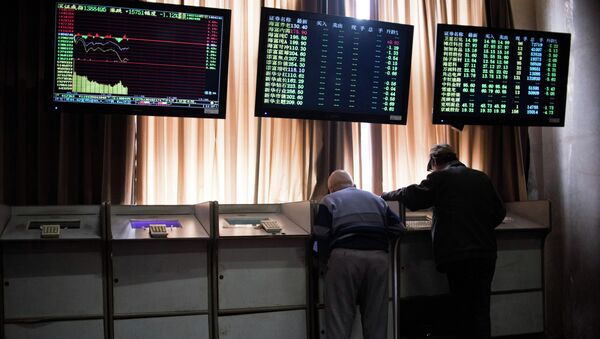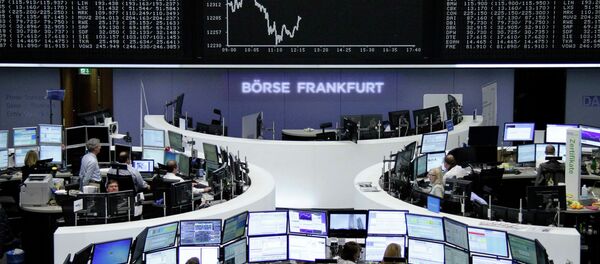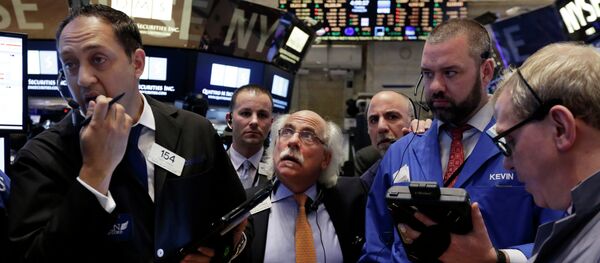Kristian Rouz — Wall Street advanced during Tuesday's trading, driven by gains in the energy sector as crude is hovering just below $60/bbl; while the across-the-board advance in commodities and the robust expansion in the Eurozone's real economy suggest the global growth is picking up pace. However, mainland China posted the weakest growth figures in six years, triggering a slide in equities at home and abroad, with the whole Asia-Pacific mostly in the red.
Tuesday's trading session in New York saw insignificant gains on the S&P 500 Index, with energy sector leading the top ten performers. Global oil price jumped to $59.11/bbl in Brent crude futures, while the US crude futures rose to $53.99/bbl, causing some moderate optimism in the domestic shale oil drillers, who might consider re-commissioning some of the previously idled oil derricks.
The S&P 500 added 0.2% at the close in New York, with energy up, and tech equities falling behind. Weak corporate earnings are weighing on the valuation of American stocks. The Dow Jones Index rose 0.3% on manufacturing gains, and the Nasdaq inched 0.2% lower.
The ongoing earnings season in the US has showcased some mixed results, as opposed to the previously anticipated losses. In financials, JP Morgan Chase reported gains in Q1 profits despite a stronger dollar, the bank's shares ended 1.6% up. Wells Fargo reported a slide in earnings, the first in 18 quarters, dipping 0.7% before recovering 0.17% overnight. The oil-drilling giant, Chevron, rose 2.2%, leading the gains in the Dow.
The US economy is signaling a moderate expansion, with US retailers reporting the largest advance in sales this past March for a year after three consecutive months of losses. US inflation rose only 0.2%, a stronger dollar prevents growth in consumer prices.
In Asia, stocks fell on Wednesday, after mainland China reported an annualized growth of 7% in Q1, and only an expansion of 1.3% compared to 1.5% in the previous quarter. The slowest pace of growth in six years in an economy that was once the driving force behind the global recovery is an alarming signal to the markets.
Healthcare equities retreated the most on the news, with Santen Pharmaceutical Co having lost 3.3% in Tokyo. Energy sector advanced naturally, with the Japanese Inpex Corp adding 1.5% in Tokyo, and Cnooc Ltd rising 3.9% in Hong Kong.
The broader MSCI Asia Pacific Index retreated 0.4%, effectively ending its nine-day winning streak, and also sliding below its seven-year high which it hit yesterday. Trading volumes were just under the highest in five years, as mainland China's news aroused the investors' activity.
China's Shanghai Composite index slid 1.2% in its greatest retreat in six weeks. Hong Kong's Hang Seng Index, however, added 0.2% due to the ongoing capital flight from the mainland via the Stock Connect scheme. In Japan, a broader Topix index lost 0.1%. The Kiwi NZX 50 slid 0.4%, the Aussie S&P/ASX 200 lost 0.6% on an ever-weaker demand for iron ore from China. Korea's Kospi, however, gained on an optimistic corporate sentiment.
In Europe, shares surpassed their 14-year highs on Wednesday, just ahead of a policy meeting at the European Central Bank (ECB). The regulator is anticipated to keep the wide-scale stimulus intact, not least in order to attract even more investment money, now exiting mainland China.
On Tuesday, the ECB hinted it would bailout the Greek banks by raising the ceiling of borrowing liquidity available to Athens, effectively fending off the linked risks.
The broadest European FTSEurofirst 300 rose 0.8%, hitting its late 2000 level, driven by the confirmed and clarified information of Nokia's acquisition of the French Alcatel. In the UK, the FTSE 100 Index hit a new high pushed up by gains in fashion, retail and pharmaceuticals.
In commodities, gold is sliding due to a stronger dollar, effectively and gradually losing its ‘safe haven' status, as financial system provides less risky investment opportunities in the market now (like the aforementioned Deutsche Bund). The yellow metal slid 0.3% Wednesday to $1,189.51/oz, while US gold for delivery in June slid farther, to $1,189.40/oz.
"Gold is having to really compete with other financial assets that offer yields," Robin Bhar of Societe Generale said. "There is still a lot of work for gold to do on the upside, there are too many headwinds at the moment and I don't think that is going to change quickly."
The US Fed is holding a policy meeting on 28-29 April, recently hinting they could still hike base interest rate as soon as in June. Nonetheless, a weak inflation might effectively force Fed to postpone further tightening, as an even-stronger dollar might kick the whole US economy into the mire of deflation.
In China, however, demand for gold is rife. On the Shanghai Gold Exchange gold premiums rose to $3-4 per ounce over the price from just $1 the previous week, meaning there's a lot of market uncertainty, and there's still no better ‘safe haven' for China's domestic investor than the metal.



